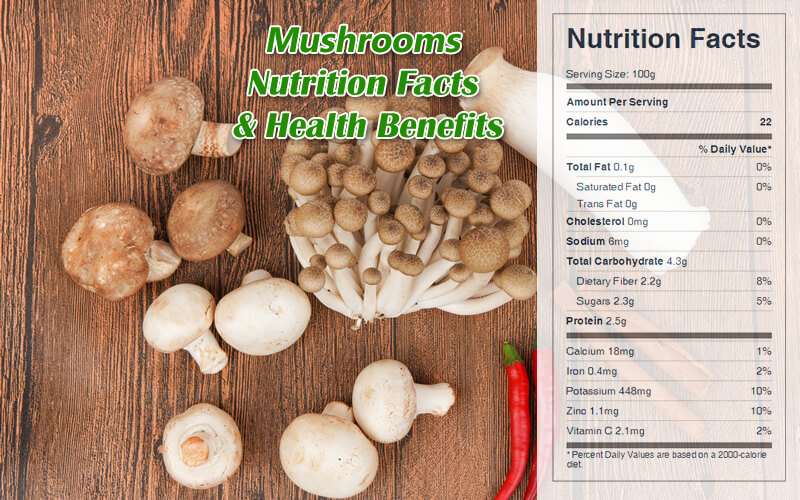Mushrooms Nutrition Facts & Health Benefits
Shiitake mushrooms are an excellent source of selenium and a very good source of iron. They are also a good source of protein, dietary fiber, and vitamin B. Here are the nutritional benefits of mushrooms.
Raw brown mushrooms are 92% water, 4% carbohydrates, 2% protein, and less than 1% fat. In a 100 gram amount, raw mushrooms provide 22 calories and are a rich source of B vitamins, such as riboflavin, niacin, and pantothenic acid, selenium, and copper, and a moderate source of phosphorus, zinc, and potassium.

Nutritional Composition of Raw Mushrooms
One-half cup of raw mushrooms provides 9 calories, 1.6 g carbohydrate, 0.7 g protein, 0.1 g fat, 0.4 g dietary fiber, 1 mg vitamin C, 1.4 mg niacin, 7 mcg folic acid, 130 mg potassium, 36 mg phosphorus, 2 mg calcium, and 4 mg magnesium.
Nutritional Composition of Dried Shiitake Mushrooms
One ounce of dried shiitake mushrooms provides 83 calories, 21.1 g carbohydrate, 2.7 g protein, 0.3 g fat, 3.2 g dietary fiber, 1 mg vitamin C, 4 mg niacin, 46 mcg folic acid, 430 mg potassium, 82 mg phosphorus, 3 mg calcium, and 37 mg magnesium.
Mushrooms Nutrition Facts Label
Health Benefits of Mushrooms
Now we have access to a wealth of different tasty fungi. Shiitake, straw, crimini, enoki, and portobello are among the most common. Most mushrooms share similar nutrition profiles; they are high in fiber and protein and provide several B vitamins, including thiamine, riboflavin, and niacin. We should all eat more mushrooms. They contain more protein than most other vegetables, they’re very low in calories, and they’re also a good source of phosphorus and potassium.
Shiitake mushrooms are sweet and neutral. They are rich in niacin, vitamins B2, B12, C, and D, glutamic acid, germanium, potassium, selenium, and zinc, as well as the polysaccharide lentinan, which boosts macrophage (white blood cell) activity. They are also believed to be a source of interferon, a protein that interferes with the viral takeover of cells.
One decent-sized field mushroom, or three button mushrooms, will give you enough B12 for a day, which is vital for vegetarians and even more so for vegans, since other plant sources of B12 are very limited. The same is true for vitamin E. Again, modern research reveals that most mushrooms are a rich source of this essential nutrient, with 100 g providing more than the minimum daily requirement.
White button mushrooms provide vitamin D, one of the very few non-animal sources for this vitamin. Vitamin D is essential for calcium metabolism and bone health. Deficiency in vitamin D is implicated in a variety of conditions, from chronic pain to Parkinson’s disease, including coronary and cardiovascular disease. Vitamin D also appears to play a role in the immune system, and it produces a hormone that has been effective against cancer cells in laboratory tests.
The vitamin D content of a mushroom is affected by postharvest handling, particularly unintentional exposure to sunlight.The United States Department of Agriculture provided evidence that UV-exposed mushrooms contain high levels of vitamin D.
When exposed to ultraviolet light, even after harvesting, ergosterol in mushrooms is converted to vitamin D2, a process now used intentionally to supply fresh vitamin D mushrooms for the functional food grocery market. In a comprehensive safety assessment of producing vitamin D in fresh mushrooms, researchers showed that artificial UV light technologies were equally effective for vitamin D production as in mushrooms exposed to natural sunlight.
Shiitake mushrooms have a long history of medicinal use in China. A compound found in shiitakes called lentinan has been investigated for its potential tumor-inhibiting capabilities as well as its antiviral and antibacterial properties. It appears to stimulate the production of white blood cells and other components of the immune system used to fight disease.
In traditional medicine, shiitake mushrooms are considered to have anti-tumor, antiviral, aphrodisiac, immune-tonic, and rejuvenative properties. They encourage stem cells in the bone marrow to create more B and T cells (important in boosting the body's immunity). Shiitakes have been used to treat AIDS, cancer, chronic cough, fatigue, high blood pressure, and high cholesterol. They also help the body get rid of excess salt.
Another compound in shiitakes, lenthionine, keeps blood platelets from sticking together and may help prevent blood clots and strokes.
Brown mushrooms appear to provide more antioxidants. Ergothioneine, found in shiitakes and several other mushrooms (notably oyster and maitake mushrooms), is an antioxidant, but it behaves differently than other sulfur-containing antioxidants (such as those in Allium and Brassica foods). Mushrooms are the richest source of this compound, which scavenges free hydroxyl radicals and may help protect against nitric oxides and regulate metal-carrying enzymes.
Health Risk
Even edible mushrooms may produce allergic reactions in susceptible individuals, ranging from a mild asthmatic response to severe anaphylactic shock.
A number of species of mushrooms are poisonous, and although some resemble certain edible species, consuming them could be fatal. Eating wild mushrooms is dangerous and should only be done by people who are knowledgeable about mushroom identification. If a mushroom cannot be positively identified, it should be considered poisonous and not eaten.